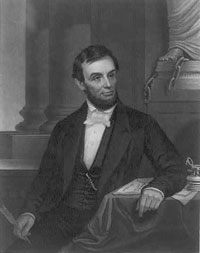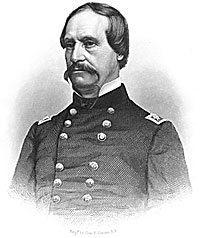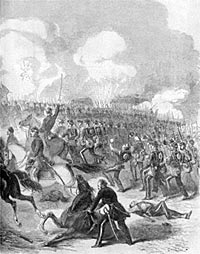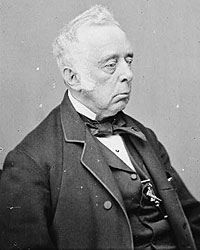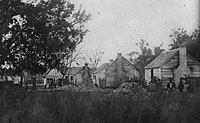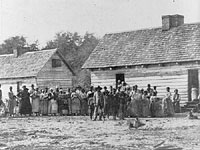David Hunter had managed to insinuate himself into a personal relationship with President Lincoln – even accompanying him on the pre-inaugural train ride from Springfield to Washington in February 1862. In the first year of the Civil War, Hunter occupied several positions – including temporary command of the Department of the West. But he was frustrated and by the winter of 1861-1862 he sought an avenue for real military distinction. Historian T. Harry Williams noted: “General David Hunter, an ambitious officer who had decided that the best way to advance his military career was to curry favor with the radicals, had impressed them with a scheme to organize an army of freed slaves. ‘It is time slavery had its quietus,’ he told [Illinois Senator Lyman] Trumbull, ‘we have been trifling long enough.’ The radicals liked Hunter’s proposal, but they knew Lincoln would never adopt it. They sneered at the president for considering the ‘lives, property, & slaves’ of the rebels ‘more precious than the lives of our soldiers.”1
Historian T. Harry Williams wrote that General Hunter determined “that the future lay with the radicals. Immediately he began to cultivate intimate relations with the Jacobin leaders and to let them know that he favored military emancipation. He became especially cordial with Stanton, whose bidding he was always ready to do.” At the end of January 1862, Hunter wrote Stanton: “Please let me have my own way on the subject of slavery. The administration will not be responsible. I alone will bear the blame; you can censure me, arrest me, dismiss me, hang me if you will, but permit me to make my mark in such a way as to be remembered by friend and foe.'”2
Although General Hunter ingratiated himself with congressional radicals, he had a talent for friction with colleagues and subordinates – especially when operating with political General James Lane in Kansas in early 1862. In mid-March, Hunter was appointed to command the Department of the South headquartered at Hilton Head, South Carolina. Hunter had “actively sought a berth from which he could free blacks,” wrote historian Mark Grimsley.3 The new commander suffered from several of the weaknesses of General George B. McClellan, commander of the Army of the Potomac. He had an elevated sense of his own importance and a belief in the superior numbers of Confederates whom he confronted. Unlike McClellan, however, he was a confirmed supporter of emancipation in his new command. Grimsley noted that “Hunter interpreted the assignment as a green light to pursue his program of military emancipation.”4 Historian Williams wrote: “Stanton must have told the general he could have a free hand with the slavery question.”5
As soon as he was able to inspect his new command at the beginning of April, Hunter wrote Secretary of War Edwin M. Stanton requesting more troops to cover the scattered posts under his control. He asked Stanton for “authority to arm such loyal men as I can find in the country.” Since the area in which he was operating did not have many loyal white men, Hunter was clearly referring to Blacks.6 Stanton did reply. Meanwhile, Hunter’s troops captured Fort Pulaski protecting the port of Savannah, Georgia. According to Hunter biographer Edward A. Miller, Jr., on April 13, “Hunter declared all slaves found in Fort Pulaski or on its surrounding island free and said that they ‘shall hereafter receive the fruits of their own labor.’ The declaration drew little or no notice in the North, probably because it affected few blacks and was not recognized to be the important assumption of authority which it was.”7
Historian Russell F. Weigley wrote: “As department commander, General Hunter proved to be more anti-slavery than the Lincoln administration intended, for Hunter almost immediately lost patience with one of the most fundamental problems of the experiment, the indeterminacy of the African Americans’ status.”8 Historian Margaret Leech noted: “The department was under martial law, and the white population had fled, abandoning their slaves. These thousands of blacks were cared for by the Government and by private philanthropy, and it was their freedom which Hunter, in all sincerity exceeding the powers of a military commander, proclaimed.”9 Hunter moved to deal with two problems simultaneously.
In order to raise the needed troops for his command, Hunter went further that he previously had and further than Lincoln Administration policy permitted. Historian Miller wrote: “General Hunter continued to be worried about the status of the department, and on 22 April he wrote to Stanton yet again, this time requesting an unspecified number of new regiments to offset the sixty-five thousand troops his intelligence had reported were aligned against him, thirty thousand at Savannah, twenty-five thousand at Charleston, and ten thousand at August. ‘With proper re-inforcements,’ he said, ‘I confidently hope to report to you in a few weeks the fall of Sumter, Charleston, and Savannah.’ Otherwise, his own force of sixteen thousand did not seem sufficient even to hold off the numbers he had estimated.”10
Stanton’s unresponsiveness was matched by Hunter’s impetuousness. “Then abruptly, on May 9, he flatly declared that the states in his department, South Carolina, Georgia, and Florida, were under martial law, that slavery and martial law in a free country are incompatible (a curious view), and that consequently all slaves in his department were ‘forever free.'”11 According to Hunter’s General Orders No. 11: “The three States of Georgia, Florida and South Carolina, comprising the military department of the south, having deliberately declared themselves no longer under the protection of the United States of America, and having taken up arms against the said United States, it becomes a military necessity to declare them under martial law. This was accordingly done on the 25th day of April, 1862. Slavery and martial law in a free country are altogether incompatible; the persons in these three States – Georgia, Florida, and South Carolina– heretofore held as slaves, are therefore declared forever free.”12
“The Treasury had been given direct responsibility for confiscated and abandoned property in the Port Royal-Sea Island area experiment and thus was deeply concerned and affected by Hunter’s action,” wrote historian Frederick J. Blue.13 Historian Mark Grimsley noted that “Nowhere else did local conditions yield such possibilities for military emancipation. Most of the coastal planters had fled months before at the approach of Union troops, leaving behind thousands of unsupervised slaves who were free in all but name. The Federal government had naturally assumed the task of caring for these abandoned slaves. Treasury Department agents put them to work harvesting cotton for sale to Northern mills, and Treasury Secretary Salmon P. Chase lent his office and personal support to dozens of Northern missionaries and teachers who sought to educate the Sea Island blacks. In this hospitable environment, Hunter moved almost at once to emancipate the slaves in his department.”14
Biographer Edward Miller wrote: “The declaration went beyond [John C.] Frémont’s proclamation, which had been limited to slaves whose owners were in rebellion, and the president continued to protect the slave property of loyal masters – at least until such owners could be compensated, as authorized in April for the District of Columbia. Hunter did not, however, limit his actions to the declaration of freedom but decided, instead, to take firm action to induce or even force the black men he liberated to fight in a Union uniform in defense of their new status. A logical as this policy may seem, it was not understood by the blacks and, in fact, was opposed.”15
Historian T. Harry Williams wrote: “Hunter did not have to implore radical favor. His bold edict, going beyond Frémont, stirred the Jacobins to vociferous applause, Governor [John] Andrew said it would encourage recruiting in New England; he pledged that if the government upheld Hunter the roads would swarm with soldiers. The radical chiefs headed by Stanton and Chase rushed to Lincoln with demands that the proclamation be allowed to stand. It was approved, Chase told him, by more than nine-tenths of the Republicans. The radicals were apprehensive about the president’s reactions, and one pessimistic congressman correctly predicted that Lincoln would sacrifice Hunter to the Border State slaveholders.”16
Historian Grimsley noted: “Hunter did not inform the Lincoln administration of his intentions ahead of time, an omission that strongly suggested his political motivation. The President only learned of the emancipation directive weeks later, and then through the newspapers. Once it became general knowledge, however, several Cabinet officers and a number of other prominent Republicans urged Lincoln to sustain the order, which is almost certainly the outcome Hunter had in mind. But Lincoln refused to let a general prod him along.”17 On May 22, President Lincoln issued a formal proclamation. After restating Hunter’s own proclamation, Mr. Lincoln stated:
And whereas the same is producing some excitement, and misunderstanding, therefore
I, Abraham Lincoln, president of the United States, proclaim and declare, that the government of the United States, had no knowledge, information, or belief, of an intention on the part of General Hunter to issue such a proclamation; nor has it yet, any authentic information that the document is genuine. And further, that neither General Hunter, nor any other commander, or person, has been authorized by the Government of the United States, to make proclamations declaring the slaves of any State free; and that the supposed proclamation, now in question, whether genuine or false, is altogether void, so far as respects such declaration.
I further make known that whether it be competent for me, as Commander-in-Chief of the Army and Navy, to declare the Slaves of any state or states, free and whether at any time, in any case, it shall have become a necessity indispensable to the maintainance [sic] of the government, to exercise such supposed power, are questions which, under my responsibility, I reserve to myself, and which I can not feel justified in leaving to the decision of commanders in the field. These are totally different questions from those of police regulations in armies and camps.
On the sixth day of March last, by a special message, I recommended to Congress the adoption of a joint resolution to be substantially as follows:
Resolved, That the United States ought to co-operate with any State which may adopt a gradual abolishment of slavery, giving to such State pecuniary aid, to be used by such State in its discretion to compensate for the inconveniences, public and private, produced by such charge of system.
The resolution in the language above quoted, was adopted by large majorities in both branches of Congress, and now stands an authentic, definite, and solemn proposal of the nation to the States and people most immediately interested in the subject matter. To the people most immediately interested in the subject matter. To the people of those states I now earnestly appeal. I do not argue. I beseech you to make the arguments for yourselves. You can not if you would, be blind to the signs of the times. I beg of you a calm and enlarged consideration of them, ranging, if it may be, far above personal and partizan politics. This proposal makes common cause for a common object, casting no reproaches upon any. It acts not the pharisee. The change it contemplates would come gently as the dews of heaven, not rending or wrecking anything. Will you not embrace it? So much good has not been done, by one effort, in all past time, as, in the providence of God, it is now your high privilege to do. May the vast future not have to lament that you have neglected it.18
Noted Civil War historian Russell F. Weigley: “In revoking Hunter’s proclamation, Lincoln nevertheless felt obliged to display his own awareness of the rushing forward of ideas and events regarding slavery. On March 6, the day when the first teachers arrived at the entrance to Port Royal harbor, Lincoln had sent to Congress an appeal for cooperation with and financial aid to any state that would adopt a plan for gradual abolition of slavery. Lincoln coupled his newest rejection of immediate and forcible abolition with another plea for gradual and voluntary abolition.”19 Noted historian Margaret Leech: “To Hunter himself, Lincoln expressed no disapprobation, and their friendship was not disturbed by the incident.”20
Lincoln biographer Ida Tarbell wrote: “The President’s treatment of Hunter’s order dissatisfied many who had been temporarily quieted by the message of March 6. Again they besought the president emancipate and arm the slaves. The authority and magnitude of the demand became such that Mr. Lincoln fairly staggered under it. Still he would not yield. He could not give up yet his hope of a more peaceful and just system of emancipation. But while he could not do what was asked of him, he seems to have felt it was possible that he was wrong, and that another man in his place would be able to see the way. In a remarkable interview held early in the summer with several Republican senators, among whom was the Honorable James Harlan, of Mt. Pleasant, Iowa, the President actually offered to resign and let Mr. Hamlin, the Vice-President initiate the policy.”21
As usual, President Lincoln was bombarded with contradictory messages about how to handle Hunter’s proclamation. Maryland conservative Reverdy Johnson wrote President Lincoln on May 16: “Genl. Hunters proclamation, declaring all the slaves in Georgia, Florida & S. Carolina free, I have just seen. For Heavens sake, at once, repudiate it, & recall the officer. The reason he assigns to it is as absurd, as the inexpediancy [sic], is glaring. Unless promptly corrected, it will serve the rebels, nicer than a dozen victories[.] Devoted, as I hope you know, to the Union, I look on the policy thus inaugurated, if to be followed, as fatal to all our hopes. As far as I am able to collect opinion here, there is but one sentiment – disapprobation – & all, are looking with confident hope, to your arresting the treason at once– “22 General Carl Schurz wrote the President Lincoln the same day with very different advice:
Yesterdays papers brought the news of Gen. Hunters proclamation freeing the slaves in his Department. I am convinced it must and will come to this all over the Cotton states during the summer, and a month or two hence a proclamation like Hunters would be looked upon as the most rational thing in the world. At the present moment it is perhaps a little premature. The thing might have been practically done without being ostensibly proclaimed. At the same time I am persuaded, the people will readily acquiesce if you see fit to sustain Hunter in his act; and then the Administration must take its position with firmness and determination. Your personal influence upon public opinion is immense; you are perhaps not aware of the whole extent of your moral power. Thus, if you should see fit to justify and sustain the act as one commanded by local military necessity, there will not be a murmur against it a fortnight hence.
But if you should feel obliged to modify Hunters proclamation, I would entreat you to consider this: As our armies proceed farther South the force of circumstances will drive us into measures which were not in the original programme, but which necessity will oblige you to adopt. It seems to me of the greatest importance that the government make no public declarations of policy which might be likely to embarrass it in the future. In fact you can hardly tell at the present moment how far you will have to go six weeks hence. The best policy would be to avoid public declarations altogether. The arming of negroes and the liberation of those slaves who offer us aid and assistance are things which must and will inevitably be done; in fact they are being done, and it would perhaps be best boldly to tell the whole truth and to acknowledge the necessity – all of which is respectfully submitted.23
The same day, Secretary of the Treasury Salmon P. Chase wrote President Lincoln from Philadelphia: “Of course I do not assume to judge of the Military necessity: but it seems to me of the highest importance, whether our relations at home or abroad be considered, that this order be not revoked. It has been made as a military measure to meet a military exigency, and should, in my judgment be suffered to stand upon the responsibility of the Commanding General who made it. It will be cordially approved, I assume, by more than nine tenths of the people on whom you must rely for support of your Administration.”24 Chase biographer Albert Bushnell Hart noted: “Though Chase had no strong influence in any of the legislative or executive measures relative to slavery, he was always the mainspring of anti-slavery influence within the councils of the President; to him the abolitionists throughout the country appealed for such action by the President as should forever stamp the institution of slavery with the crushing disapproval of the people in arms.”25The New York Tribune editorialized:
“The President has decided to rescind or modify Gen. [David] Hunter’s Order setting free all the slaves in his Military Department. It was his right to do so and we bow to his decision. We cannot doubt that Gen. Hunter judged wisely and acted nobly so far as the prosperity of the Union cause in his own District was concerned. We do not believe the President holds a different opinion. But it is his duty to survey the whole ground, to determine what is best not for three States only, but to insure the triumph of the Union cause everywhere. And from his decision there is no appeal.
But we entreat the President now to consider and act upon the manifest necessity of having a definite, unvarying, clearly understood policy with regard to this subject. On behalf of the whole People we demand an unequivocal official answer to these questions – ‘What shall be the future condition of the slave of a Rebel who escapes from the dominions of Jeff. Davis and comes within the lines of our armies?’ ‘What of those slaves who are abandoned by their Rebel masters fleeing before the advancing hosts of the Union?’ ‘What of the slave whose Rebel master remains with him until both are enveloped by the Union forces?’26
Historian T. Harry Williams wrote: “Lincoln left the door ajar to the Jacobins by saying that he alone would determine when emancipation was necessary, which hinted that at some future date he might decide it was. But this was scant comfort to the disappointed radicals, who saw Lincoln still enmeshed in the net of conservatism. Greeley angrily demanded that the administration get itself a policy and quit appeasing the Democrats. Among the sullen Jacobins only Senator Grimes took a philosophical view of the episode. He professed no indignation because he had expected Lincoln to nullify the proclamation. Why rail? asked Grimes. Emancipation would come in the end, ‘protracted by the obstinacy and stupidity of rulers it may be, but come it will nevertheless.'”27
Footnotes
- T. Harry Williams, Lincoln and the Radicals, p. 55 (Letter from David Hunter to Lyman Trumbull, December 9, 1861).
- T. Harry Williams, Lincoln and the Radicals, p. 138 (Letter from David Hunter to Edwin M. Stanton, January 29, 1862).
- Mark Grimsley, The Hard Hand of War, p. 127 (Letter from David Hunter to Edwin D. Stanton, January 29, 1862).
- Mark Grimsley, The Hard Hand of War, p. 127.
- T. Harry Williams, Lincoln and the Radicals, p. 137.
- Edward A. Miller, Jr., Lincoln’s Abolitionist General: The Biography of David Hunter, p. 97.
- Edward A. Miller, Jr., Lincoln’s Abolitionist General: The Biography of David Hunter, p. 98.
- Russell F. Weigley, A Great Civil War: A Military and Political History, 1861-1865, p. 167.
- Margaret Leech, Reveille in Washington, p. 247-248.
- Edward A. Miller, Jr., Lincoln’s Abolitionist General: The Biography of David Hunter, p. 99.
- Russell Frank Weigley, A Great Civil War: A Military and Political History, 1861-1865, p. 167 .
- Roy P. Basler, editor, The Collected Works of Abraham Lincoln, Volume V, p. 222 (May 9, 1862).
- Frederick J. Blue, Salmon P. Chase: A Life in Politics, p. 182.
- Mark Grimsley, The Hard Hand of War, p. 127.
- Edward A. Miller, Jr., Lincoln’s Abolitionist General: The Biography of David Hunter, p. 99.
- T. Harry Williams, Lincoln and the Radicals, p. 137.
- Mark Grimsley, The Hard Hand of War, p. 128.
- Roy P. Basler, editor, The Collected Works of Abraham Lincoln, Volume V, p. 222-223 (May 19, 1862).
- Russell F. Weigley, A Great Civil War: A Military and Political History, 1861-1865, p. 167.
- Margaret Leech, Reveille in Washington, p. 247-248.
- Ida Tarbell, Life of Abraham Lincoln, Volume II, p. 103.
- Abraham Lincoln Papers at the Library of Congress. Transcribed and Annotated by the Lincoln Studies Center, Knox College. Galesburg, Illinois. (Letter from Reverdy Johnson to Abraham Lincoln, May 16, 1862).
- Abraham Lincoln Papers at the Library of Congress. Transcribed and Annotated by the Lincoln Studies Center, Knox College. Galesburg, Illinois. (Letter from Carl Schurz to Abraham Lincoln, May 16, 1862).
- Abraham Lincoln Papers at the Library of Congress. Transcribed and Annotated by the Lincoln Studies Center, Knox College. Galesburg, Illinois. (Letter from Salmon P. Chase to Abraham Lincoln, May 16, 1862).
- Albert Bushnell Hart, Salmon Portland Chase, p. 263.
- Herbert Mitgang, editor, Abraham Lincoln: A Press Portrait, p. 293 (New York Tribune, May 20, 1862).
- T. Harry Williams, Lincoln and the Radicals, p. 138.




